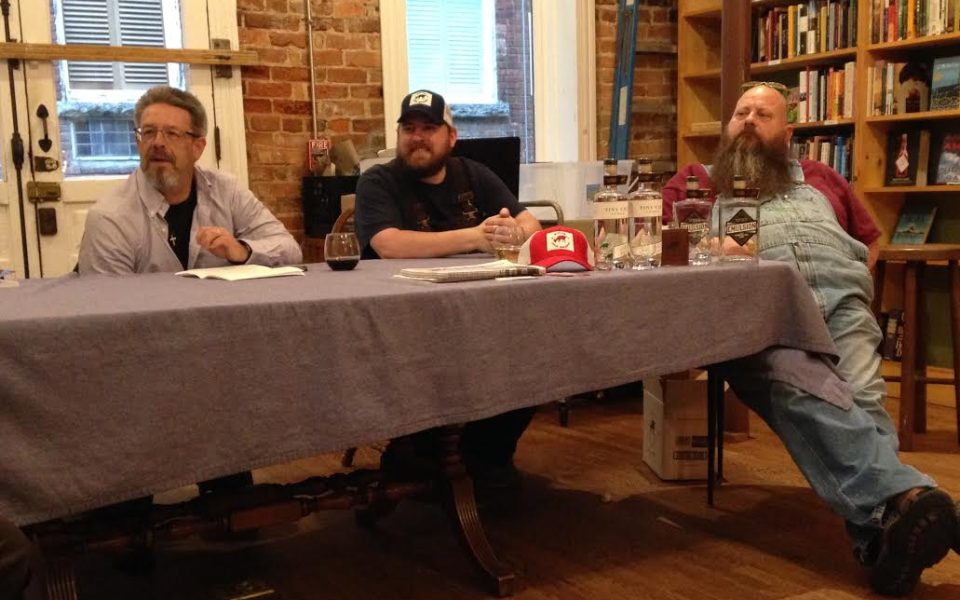A book signing doesn’t often look like a cocktail party. But John Francis Trump, author of Still & Barrel: Craft Spirits in the Old North State published by Winston-Salem-based John F. Blair, Publisher, made the event at Greensboro’s Scuppernong Books on May 12 a conversation by talking from his chair and allowing guests to interject questions throughout.
Inspired by a distillery passport produced by the state Department of Agriculture and Consumer Services — which is now the app “NC Spirits” — Trump and his wife, Lisa Snedeker, traveled last summer to every North Carolina distillery with products on ABC store shelves. Snedeker snapped photos while Trump — the managing editor of the conservative Carolina Journal — talked with distillers about what they do and why they’re in a business that sees very little profit for the local guy.
“North Carolina liquor sales account for only 0.3 percent of alcohol sales in the state,” Trump said at the reading, echoing the introduction of his book. Scot Sanborn, owner of Sutler’s Spirits in Winston-Salem, had told him the profits from his business were “enough to buy sushi once in a while,” but not enough to get rich.
Particularly given the pace of the state’s current liquor laws. Senate Bill 155, known as the “brunch bill,” was referred to the finance committee on March 30, and has yet to advance. If passed, it will not only allow restaurants and bars to serve alcohol at 10 a.m. on Sundays; distilleries will be able to sell five bottles per customer per year on-site as opposed to the current one bottle per year limit.
Bill and Andrew Norman, a father-son team at Fainting Goat Spirits in Greensboro, were part of the panel discussion during the event. Bill noted that distilleries pay the same amount of tax on bottles whether they’re sold on-site or at ABC stores, but selling more than one bottle to tour participants would mean greater revenue in the long-term, as would being able to mix their liquor into drinks at the tasting room.
The backwardness makes sense when you consider the state’s history: As the first in the South to ban alcohol, it ended Prohibition four years after the 21st Amendment and lifted the ban on making liquor in 1979. Even then, North Carolina’s first legal distillery, Piedmont Distillers in Madison, opened in 2005.
Liquors like moonshine, vodka and gin can be sold immediately, but aged products such as whiskey and bourbon take time to barrel age, particularly in the traditional method with new American oak barrels. That’s why Fainting Goat Spirits’ Tiny Cat vodka and Emulsion gin are on the distillery’s and ABC stores’ shelves — and why their three whiskies aren’t.
“Kentucky has a 100-year jump on everyone else,” Trump said, since some distillers “barreled through Prohibition.”
And while it might sound nice that ABC stores have a North Carolina section, “it ends up being the opposite of what you want,” Bill said. Not only does the practice silo the local products, as distillers say; consumers go to the vodka section if they want vodka, for instance, but the North Carolina products aren’t there.
“Unless you know where to look for them, you won’t find them,” Trump said.
Often, the North Carolina section is in a corner of the store. And to put their products on ABC shelves, local distillers must visit the municipality’s board in person and show them the product, which is not tasted.
However, as Trump writes, “Craft distillers press forward because they believe their products pay homage to the distillers who once saturated North Carolina and because their spirits are better than those produced on a massive scale.”
Join the First Amendment Society, a membership that goes directly to funding TCB‘s newsroom.
We believe that reporting can save the world.
The TCB First Amendment Society recognizes the vital role of a free, unfettered press with a bundling of local experiences designed to build community, and unique engagements with our newsroom that will help you understand, and shape, local journalism’s critical role in uplifting the people in our cities.
All revenue goes directly into the newsroom as reporters’ salaries and freelance commissions.


Leave a Reply